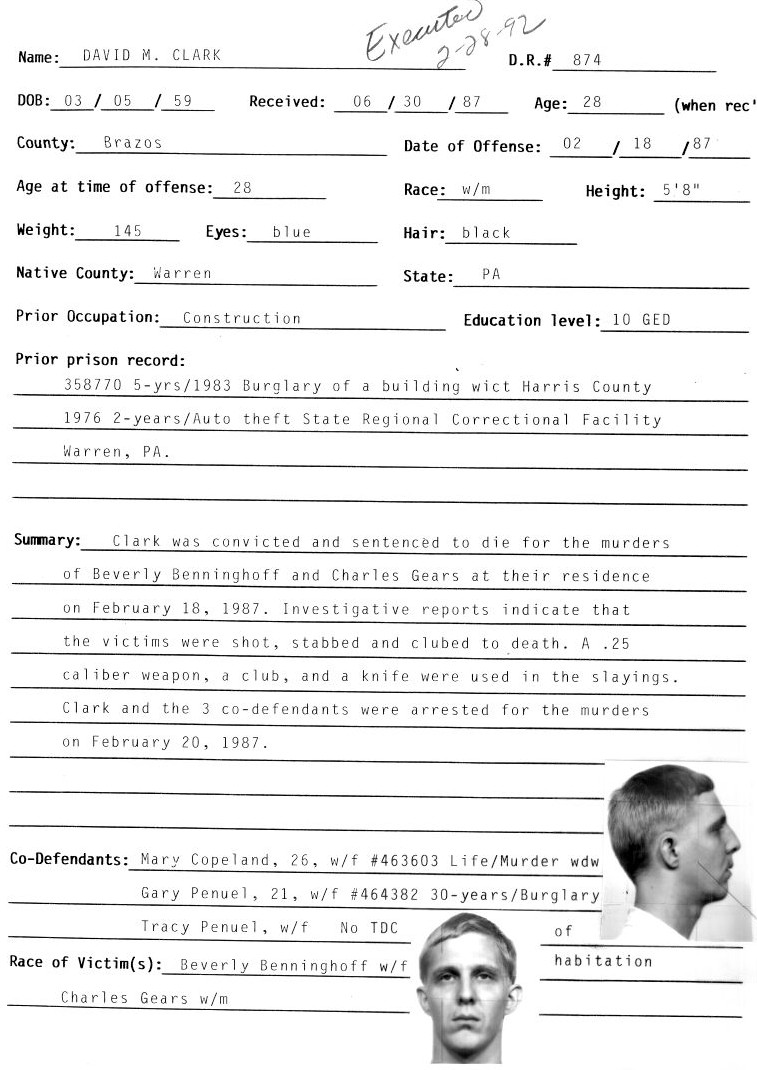U.S. Supreme Court
502 U.S. 1052 116 L.Ed.2d 924
David Michael CLARK, petitioner,
v.
James A. COLLINS, Director, Texas Department of Criminal Justice,
Institutional Division.
No. 91-7018.
Supreme Court of the United States January 17, 1992
The application for stay of
execution of sentence of death presented to Justice SCALIA and
by him referred to the Court is denied. The petition for writ of
certiorari is denied. The order heretofore entered by Justice
SCALIA is vacated.
Justice STEVENS, with whom Justice BLACKMUN
joins, dissenting.
The direct review of petitioner's conviction
was not completed until November 18, 1991, when this Court
denied certiorari. See ___ U.S. ___, 112 S.Ct. 443, 116 L.Ed.2d
461 (1991). Petitioner's lawyer, a solo practitioner, was unable
to represent petitioner in post-conviction proceedings.
Meanwhile, an execution date of January 17, 1992 had already
been set by the trial court. Petitioner, who is indigent, was
unable to find a lawyer to represent him until December 27,
1991. On January 3, 1992, petitioner's new lawyer requested a
modification of the execution date so that he could familiarize
himself with the record; however, his request was denied.
On January 15, 1992, petitioner filed an
application for post- conviction writ of habeas corpus in the
trial court and the Texas Court of Criminal Appeals. The next
day, the trial court denied a stay of execution. Within the span
of a few hours, the Court of Criminal Appeals adopted the trial
court's findings, and denied the application; the District Court
denied petitioner's first federal habeas petition an hour after
it was filed; and the Court of Appeals for the Fifth Circuit
affirmed the denial of federal habeas corpus relief by a divided
court.
Writing in dissent, Judge Davis explained
that he would "grant the stay in this initial federal habeas
petition" because he was "unable to adequately assess Clark's
claim of ineffective assistance of counsel without reviewing the
pertinent portions of the trial record, which are not now
available to [him]." Slip op., at 7.
As a matter of policy, I
believe that we should routinely grant the stay application in
all first federal habeas corpus cases "in order to be sure that
a death row inmate may have the same opportunity to have his or
her federal claims considered by this Court as does any other
applicant." Kyles v. Whitley (No. A-280), 498 U.S. ___, 111 S.Ct.
333, 112 L.Ed.2d 298 (1990) (STEVENS, J., concurring in denial
of application).
This case, however, presents an extreme
example of why this is so. The compressed schedule has denied
state and federal courts the opportunity to review filings with
adequate time for reflection, much less to review the record, or
even to receive a full response from the State.
1
Indeed, it is doubtful that counsel has had a
fair opportunity to discharge his professional obligations. Thus,
the more prudent approach is to grant a stay and to have
procedures follow in their proper course. Accordingly, I
respectfully dissent.
Footnotes
[ Footnote 1 ]
The State, in response to petitioner's federal habeas petition,
said that its "non-opposition" was based "on the recognition
that additional time may be necessary in order for the Court to
resolve the claims asserted by Clark," and also because the
State has had to prepare for several executions in the space of
a week and "simply has not adequately digested the record in
light of Clark's claims, received only this morning."
Respondent's Response to Petitioner's Request for Stay of
Execution 9-10.[ Clark v. Collins 502 U.S. 1052 (1992) ]


